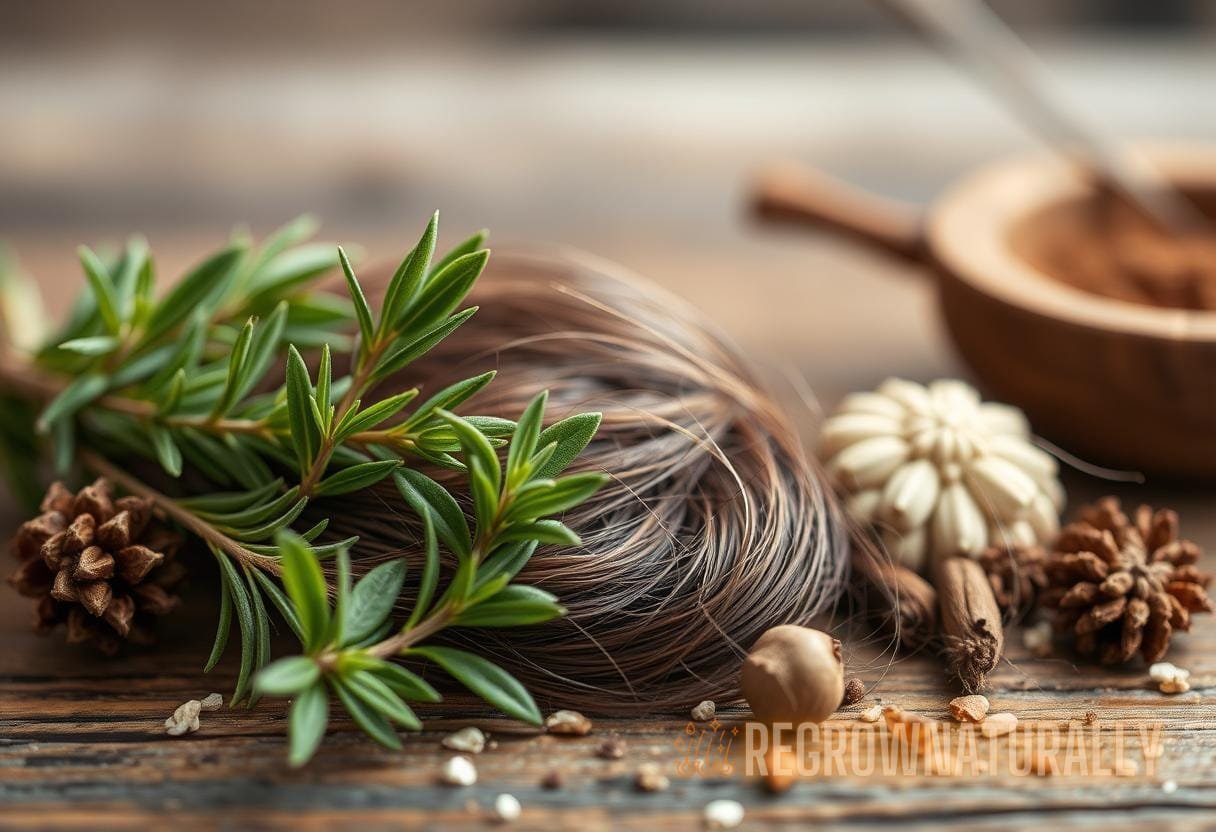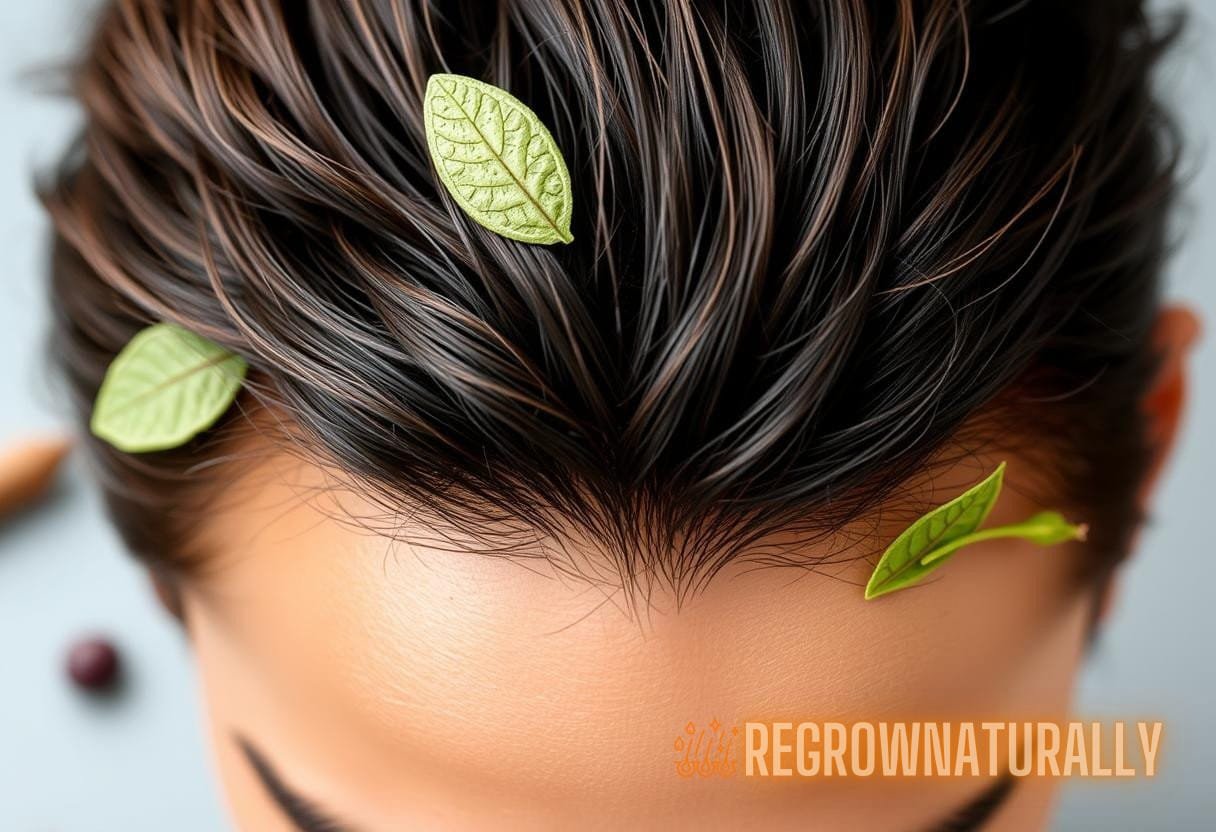Understanding Herbal Synergy: The Role of Phytochemicals in Scalp Health
Hair loss is a significant concern for many, leading to a quest for effective solutions. One such solution lies in understanding herbal scalp synergy, which involves the collaboration of various natural compounds to foster a healthy scalp microbiome. Recent scientific studies indicate that phytochemicals in herbs can influence the scalp microbiome positively and potentially enhance hair restoration.
What are Phytochemicals?
Phytochemicals are bioactive compounds found in plants that contribute to their color, flavor, and disease resistance. These compounds hold the potential for numerous health benefits, including the promotion of scalp health. Key classes of phytochemicals include:
- Flavonoids: Known for their antioxidant properties.
- Terpenoids: Possess anti-inflammatory effects.
- Alkaloids: May stimulate hair growth.
- Phenolic Compounds: Protect against oxidative damage.
Through interactions and synergies among these phytochemicals, the healing potential for the scalp is greatly enhanced.
The Scalp Microbiome: A Crucial Component of Hair Health
The scalp microbiome consists of a diverse community of microorganisms that play a vital role in maintaining skin health. Many studies, including those published in the National Institutes of Health, have shown that a balanced microbiome contributes to:
- Regulating inflammation.
- Combatting pathogenic microbes.
- Supporting hair follicle function.
Disruption of this balance can lead to various scalp conditions, ultimately affecting hair growth and health.
How Phytochemicals Influence the Scalp Microbiome
The interaction of phytochemicals with the scalp microbiome creates a unique ecosystem that aids in hair restoration. Here are some mechanisms by which herbal scalp synergy unfolds:
- Antimicrobial Effects: Certain phytochemicals possess antimicrobial properties that can help maintain a healthy balance of the scalp microbiome.
- Anti-inflammatory Action: Inflammation can inhibit hair growth—compounds like flavonoids can reduce this issue.
- Stimulation of Hair Follicle Activity: Alkaloids and other growth-promoting phytochemicals can encourage hair follicles to remain in the growth phase longer.

Integrating these natural ingredients into hair care routine supports a healthy scalp environment.
Key Herbs for Enhancing Herbal Scalp Synergy
There are several powerful herbs that can be incorporated into hair care regimens for their synergistic effects.
1. Rosemary
Rosemary is well-regarded for its ability to stimulate hair growth. Its phytochemicals enhance blood circulation to the scalp, encouraging healthier follicles. Studies suggest that its extract can even be as effective as minoxidil in promoting hair growth, which is significant.
2. Peppermint
Peppermint oil contains menthol, which promotes circulation and provides a refreshing sensation to the scalp. This herb’s phytochemicals help to clear the scalp of excess oil and impurities, thus supporting a vibrant microbiome.
3. Saw Palmetto
Evidence suggests that saw palmetto can block the conversion of testosterone to DHT, a hormone linked to hair thinning. Its phytochemicals may exhibit anti-inflammatory properties that support a balanced scalp environment.
4. Nettle
Nettle is often praised for its high antioxidant content. It can also inhibit DHT production, along with promoting increased circulation in the scalp. The herbal scalp synergy of nettle can help in reducing inflammation and boosting hair health.
Implementing Herbal Scalp Synergy in Your Hair Care Routine
Incorporating these herbs into your daily routine can be done through various methods:
- Infused Oils: Create a hair oil using a blend of these herbs. Infuse oils like coconut or jojoba with dried herbs for several weeks.
- Herbal Rinses: Boil herbs in water to create a rinse that can nourish the scalp.
- Essential Oils: Use essential oils diluted with carrier oils for scalp massages.
These practices can leverage the full potential of herbal scalp synergy.
Case Studies: The Impact of Phytochemicals on Scalp Health
Numerous case studies and clinical trials back the efficacy of using herbal remedies for hair loss and scalp care. For example, a study published in the Journal of Dermatology highlighted the positive effects of saw palmetto on androgenetic alopecia. The use of this herb significantly improved hair density compared to placebo groups.

Another trial examined the effectiveness of rosemary oil in patients suffering from alopecia areata. Participants applying rosemary oil experienced significant improvements in hair growth over a 6-month period. These results indicate the profound impact herbal scalp synergy can have on hair restoration efforts.
Integrating Herbal Synergy with Conventional Treatments
While natural remedies are powerful, combining them with conventional treatments can enhance results. Here’s how:
- Supplement Your Routine: Use herbal treatments along with topical or oral medications prescribed by a healthcare professional.
- Consultation: Discuss with a dermatologist or trichologist about integrating herbal treatments into your overall hair care plan.
- Monitor Progress: Regularly evaluate the effectiveness of the combined approach to adjust the treatment plan as necessary.
Safety and Precautions
While herbal remedies are generally safe, it’s crucial to follow certain guidelines. Here are tips to ensure safe use:
- Patch Test: Perform a patch test before applying herbal oils or extracts on the scalp to avoid allergic reactions.
- Consult Healthcare Providers: Especially if pregnant, nursing, or on medication, consult a healthcare professional before starting any herbal regimen.
- Quality Herbal Products: Ensure the herbs and products used are sourced from reputable suppliers to avoid contaminants.
Final Thoughts on the Role of Herbal Scalp Synergy
As research continues to unravel the complexities of the scalp microbiome and the roles phytochemicals play, the importance of integrating herbal scalp synergy in hair restoration efforts cannot be understated. Emphasizing a holistic approach that balances nature and science promises hope for many dealing with hair loss.
Resources for Further Reading
For those interested in delving deeper into the science of herbal remedies, consider exploring the following resources:
- Frontiers in Nutrition – Herbal and Dietary Therapies in Hair Loss.
- ScienceDirect – Phytochemicals and Their Role in Hair Growth.
- Explore more about Herbal Remedies.
- Discover Scalp Care Tips.
Join the Community
Engage with others interested in herbal scalp synergy by joining forums and groups discussing scalp health and hair restoration. Sharing experiences and resources can empower and support your journey to better hair health.



